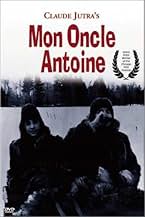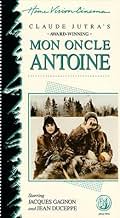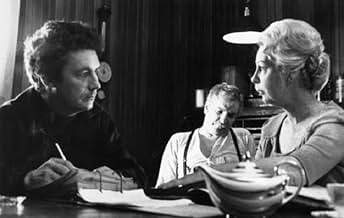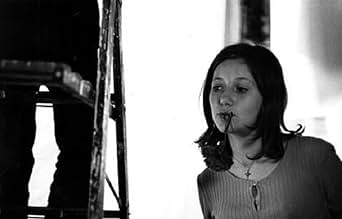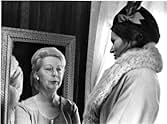Dans le froid de la campagne québécoise, à l'époque de Noël, nous suivons le passage à l'âge adulte d'un jeune garçon et la vie de sa famille, propriétaire du magasin général et de l'entrepr... Tout lireDans le froid de la campagne québécoise, à l'époque de Noël, nous suivons le passage à l'âge adulte d'un jeune garçon et la vie de sa famille, propriétaire du magasin général et de l'entreprise de la ville.Dans le froid de la campagne québécoise, à l'époque de Noël, nous suivons le passage à l'âge adulte d'un jeune garçon et la vie de sa famille, propriétaire du magasin général et de l'entreprise de la ville.
- Réalisation
- Scénario
- Casting principal
- Récompenses
- 6 victoires et 2 nominations au total
- Le cure
- (as René Salvatore Catta)
Avis à la une
The film meanders amiably along, capturing in unhurried pace the life of rural 1940's Quebec, in this case an asbestos mining town. The main characters are Benoit, an orphaned boy, the local undertaker Antoine and his assistant Fernand played by the director himself Claude Jutra. Eventually the film reaches its big set-piece, a long, extended night sequence where Benoit and Antoine (covered in furs) must traverse the icy, snow covered landscape via sled to retrieve the body of a boy who has died at a farmhouse.
The director was hailed as the new savior of Canadian cinema at the time of release, but unfortunately never achieved the level of success later on that he did with this film. He mysteriously disappeared one winter and his body was discovered the following spring after the ice had thawed...a simple note attached, "My name is Claude Jutra".
It would be far too easy to resort to stereotypes, clichés and single-minded myopic statements in this story. Yet the director chose to skip the forced imagery and instead, focused on the essence of life in rural Québec of the time. That makes this film exceptional in its authenticity while not being pretentious in its presentation. If only more contemporary cinematic endeavors would do the same, the viewing public might not be forced to choose between the over-hyped Hollywood Pablum that passes for 'Must See' viewing.
Mon Oncle Antoine is - in every sense of the word - unforgettable. It will leave a lasting impression on anyone who has ever lived in - or visited - Québec. A classic. **********************************************
Follow-up: 10 May 2008
After reviewing some of the comments, it's worth noting Mon oncle Antoine is NOT - and probably wasn't MEANT to serve as standard Hollywood/American cinema for mass market sales. A coming of age story, yes, but far more than simple memoirs of adolescence in 1940's Québec. Viewers who're looking for sheer entertainment at the expense of complex development of the characters will be sorely disappointed. Go watch action/adventure/romance/comedies to be amused. Watch Mon oncle Antoine to be drawn into a seldom seen, but absolutely remarkable society that has been overlooked and ignored for far too long.
The Grapes of Wrath is hardly an edge-of-the-seat thriller, yet the story and characters are what makes this American classic an enduring film. Mon oncle Antoine is in the same genre.
Looking through the eyes of a teenage boy Benoit (Gagnon), Jutra's ethnographic artwork assiduously records what he sees and experiences in a few days' span, Benoit's uncle Antoine (Duceppe) and auntie Cécile (Thibault) run a general shop but also manage the town's undertaker business, a funeral ceremony near the beginning presided by Antoine and his shop clerk Fernand (Jutra himself, oozing with assured apathy) subtly conveys a ghost of friction between them, soon an overtly uncomfortable shot of Fernand and Cécile's encroaching closeness hints something smack of a tacitly connived adultery is on the sly, maybe that's why. On the Christmas Eve, townsfolk gather in the shop to see the Christmas display and purchase gifts, a young couple announce their engagement, a voluptuous wife comes to try on her ordered corset, by default becomes the cynosure, on the same floor, intrigued by his awakening curiosity of the other sex, Benoit fumbles around Carmen (Champagne), a comely girl of his age who also works in the shop, a budding puppy love is always adorable.
Still, even at Christmas, people die, Madame Poulin's (Loiselle) eldest son dies that day (the cross overhangs is jarringly prominent in that frame of pathos), and Benoit is permitted, for the very first time, to go with Antoine to pick up the body, to-and-fro, it is a sortie saddled with abundant snow, piercing coldness, influence of liquor, and an ingenuous teen's rite-of-passage to face death at point-blank range and saver his first taste of misery, deception and dissatisfaction from the adult world. From excited to dismayed, then exasperated, the non-professional Jacques Gagnon exerts devoted commitment during the key sequences where a crepuscular snowscape unremittingly precipitates viewers' body temperate to slump with the characters on the screen when riding through the rigors of a wintry night, during which, a snowfield face-off between Benoit and the old soak Antoine lets the emotional punch kick in, a lifetime of disappointment is encapsulated by Duceppe's drunkard hurling, especially when it is closely followed by what is happening inside Cécile's cozy boudoir, life is never fair and it is a miracle how can we not all succumb to be cynical and misanthropic after being buffeted by the bread-and-butter blues.
That is the damning feeling encircles Jutra's unflinching realism-inflected enterprise, it is boldly unsentimental, but also alarmingly despondent, that's how it reaches the finish-line, whatever Benoit sees through the windowpane, real or fanciful, this Bildungsroman of an impressionable boy can only descend further into uninviting harshness, much as the film's natural backdrop, MON ONCLE ANTOINE is more congenitally formidable than heartfelt compelling, but that's also where lies its enduring strength!
Le saviez-vous
- AnecdotesThe film is included on Roger Ebert's "Great Movies" list.
- Citations
Benoit: [Benoit and his uncle Antoine try to recover a casket that has fallen off their sleigh. Antoine is in a drunken state] Don't let go!
Uncle Antoine: I can't, Benoit. Sometimes you just can't.
Benoit: Yes, you can! My arm's in a cast and I can do it. We're almost there. Don't give up. You can do it.
Uncle Antoine: [Dejectedly, and in a drunken stupor] What am I doing here, Benoit? I'm not happy. I'm not made for the country. I hate it here. I wanted to buy a hotel in the States. Your aunt wouldn't let me. She says no to everything. I'm afraid of corpses. I've been afraid of corpses for 30 years! I work for everybody. Your aunt never gave me a child. I have to take care of other peoples' children. I raise Carmen and you. Haven't I done all I could for you?
Benoit: Drunkard.
[Uncle Antoine breaks down, sobbing. Benoit looks at him with contempt]
Benoit: Drunkard!
[Sobbing continues]
- Crédits fousThe actor who plays the Big Boss is billed as Georges Alexander in the original French language version, but as George Alexander in the dubbed English version.
- ConnexionsEdited into 50 ans (1989)
Meilleurs choix
- How long is My Uncle Antoine?Alimenté par Alexa
Détails
- Date de sortie
- Pays d’origine
- Site officiel
- Langues
- Aussi connu sous le nom de
- My Uncle Antoine
- Lieux de tournage
- Société de production
- Voir plus de crédits d'entreprise sur IMDbPro
Box-office
- Budget
- 750 000 $CA (estimé)
- Durée1 heure 44 minutes
- Mixage
- Rapport de forme
- 1.33 : 1
Contribuer à cette page


